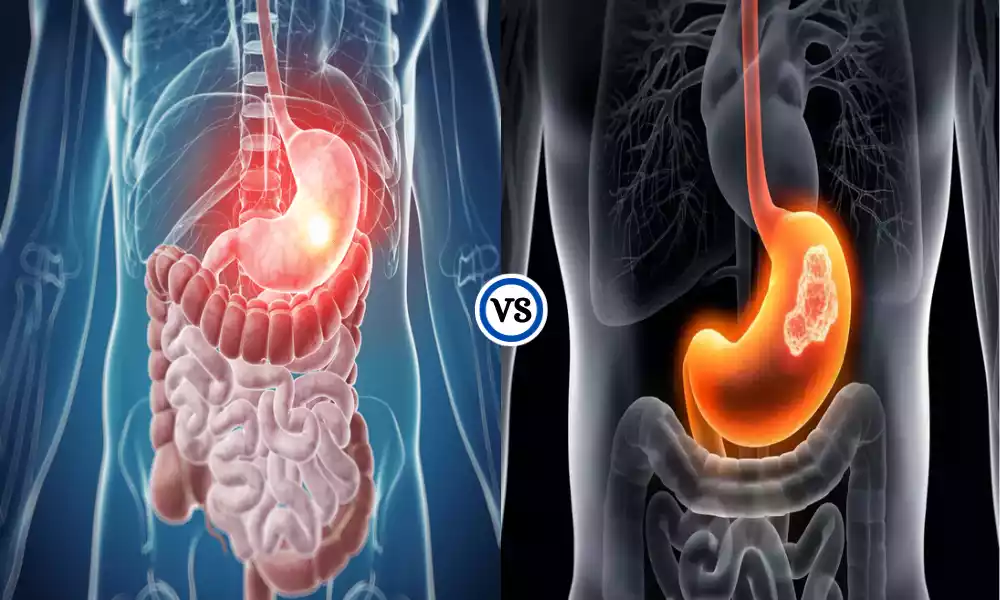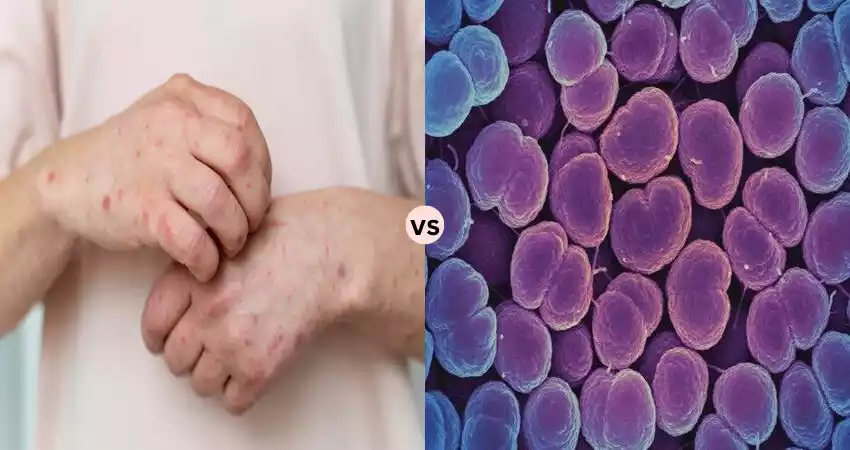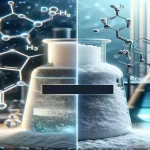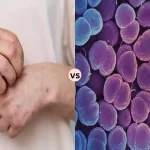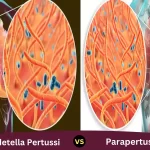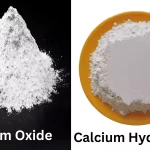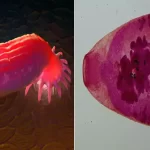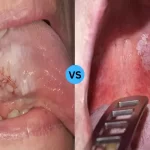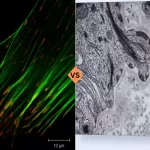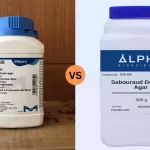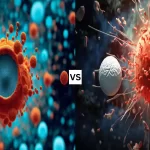Gastritis and stomach cancer are two significant gastrointestinal conditions affecting the stomach. Gastritis is an inflammation of the stomach lining, often caused by factors like excessive alcohol consumption, medications, or infections. It can lead to symptoms such as abdominal pain and indigestion. In contrast, stomach cancer, also known as gastric cancer, is a malignant growth that originates in the stomach lining.
This condition typically develops slowly, progressing from chronic gastritis. Early stages of stomach cancer may present with few symptoms, but as it advances, it can lead to severe symptoms like abdominal discomfort, unintentional weight loss, and blood in the stool. Both gastritis and stomach cancer underscore the importance of gastric health awareness, early detection, and proper medical care.
Definition of Gastritis
Gastritis is a medical condition characterized by the inflammation of the inner lining of the stomach, known as the gastric mucosa. This inflammation can be caused by various factors, including infections (such as Helicobacter pylori), excessive alcohol consumption, chronic use of non-steroidal anti-inflammatory drugs (NSAIDs), stress, and autoimmune disorders. Gastritis can manifest with symptoms like stomach pain, nausea, vomiting, bloating, loss of appetite, and indigestion.

Depending on its cause and severity, gastritis can range from mild and temporary to chronic and more serious. Proper diagnosis and treatment are essential to alleviate symptoms and prevent potential complications.
Causes and Symptoms of Gastritis
Causes of Gastritis:
Gastritis can have various causes, and it often results from irritation or damage to the stomach lining. The main risk factors include:
- Helicobacter pylori Infection: This bacterium is a major cause of gastritis. It can weaken the stomach’s protective lining, making it more susceptible to inflammation.
- Excessive Alcohol Consumption: Heavy alcohol use can irritate the stomach lining and lead to acute gastritis or even chronic gastritis over time.
- Chronic Use of Non-Steroidal Anti-Inflammatory Drugs (NSAIDs): Medications like aspirin, ibuprofen, and naproxen can irritate the stomach lining when used over an extended period.
- Stress: Severe stress or trauma can trigger gastritis in some individuals by affecting the stomach’s protective mechanisms.
- Autoimmune Disorders: Conditions like autoimmune gastritis can lead to the immune system mistakenly attacking the stomach lining.
- Bile Reflux: When bile flows into the stomach, it can cause irritation and gastritis, especially after surgery or in individuals with a history of certain digestive disorders.
- Infections: Besides H. pylori, other infections, such as viral or fungal infections, can also lead to gastritis, although they are less common.
Symptoms of Gastritis:
The symptoms of gastritis can vary in intensity and duration, and not everyone with gastritis will experience all of these symptoms. Common symptoms include:
- Stomach Pain: This is often described as a burning or gnawing sensation in the upper abdomen, which can become more pronounced after eating.
- Nausea and Vomiting: Gastritis can lead to feelings of nausea, and in some cases, it may result in vomiting.
- Indigestion: Individuals with gastritis may experience discomfort or a feeling of fullness in the upper abdomen, especially after eating.
- Loss of Appetite: Gastritis can cause a reduced desire to eat, which may lead to weight loss.
- Bloating: Some people with gastritis may experience abdominal bloating and a sensation of pressure in the stomach area.
- Vomiting Blood or Coffee Ground-Like Material: In severe cases or when the stomach lining is significantly damaged, gastritis can lead to vomiting blood or dark, coffee ground-like material, which requires immediate medical attention.
- Black, Tarry Stools: Similarly, severe gastritis may result in the passage of black, tarry stools, which can indicate bleeding in the digestive tract.
Chronic gastritis can exist for an extended period with mild or no symptoms, making it essential for individuals with risk factors or persistent digestive discomfort to seek medical evaluation for proper diagnosis and management.
Definition of Stomach Cancer
Stomach cancer, medically referred to as gastric cancer, is a malignant disease that originates in the tissues of the stomach. It is characterized by the uncontrolled and abnormal growth of cancerous cells within the lining of the stomach wall. Stomach cancer often develops slowly over many years and may not cause noticeable symptoms in its early stages. However, as it advances, it can lead to a range of symptoms such as abdominal pain, unexplained weight loss, vomiting, and digestive difficulties.
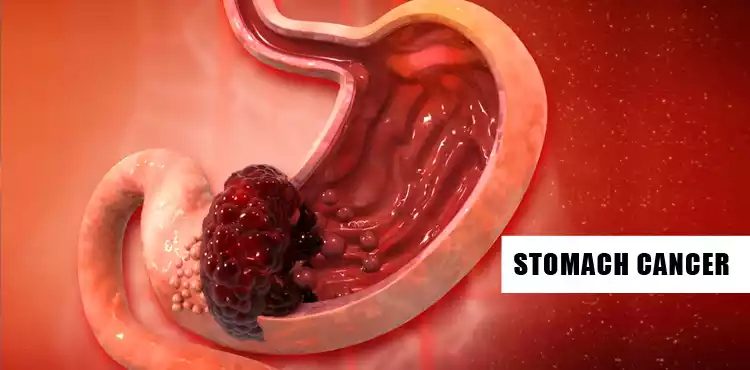
Stomach cancer is a serious and potentially life-threatening condition that requires prompt medical attention for diagnosis and treatment. Treatment options may include surgery, chemotherapy, radiation therapy, targeted therapy, and immunotherapy, depending on the stage and type of cancer. Early detection and intervention are crucial for improving the prognosis and chances of survival in individuals with stomach cancer.
Causes and Symptoms of Stomach Cancer
Causes of Stomach Cancer (Gastric Cancer):
The exact cause of stomach cancer is not always clear, but several risk factors have been identified that can increase the likelihood of developing this malignancy. Common causes and risk factors include:
- Helicobacter pylori (H. pylori) Infection: This bacterium can cause chronic inflammation of the stomach lining, increasing the risk of stomach cancer over time.
- Diet: Diets high in smoked, salted, or pickled foods, as well as low consumption of fruits and vegetables, may raise the risk of stomach cancer.
- Tobacco and Alcohol Use: Smoking tobacco and heavy alcohol consumption are known risk factors for stomach cancer.
- Family History: A family history of stomach cancer can increase an individual’s susceptibility to the disease, suggesting a potential genetic component.
- Previous Stomach Surgery: Individuals who have undergone stomach surgery for other conditions may have an increased risk of stomach cancer.
- Pernicious Anemia: A condition in which the stomach lacks a protein necessary for absorbing vitamin B12, known as intrinsic factor, can increase the risk of gastric cancer.
- Obesity: Obesity has been linked to an elevated risk of various cancers, including stomach cancer.
- Certain Occupational Exposures: Exposure to certain chemicals, such as those found in the rubber and coal industries, may raise the risk.
Symptoms of Stomach Cancer (Gastric Cancer):
The symptoms of stomach cancer can be subtle in the early stages, leading to delayed diagnosis. As the disease advances, its symptoms may become increasingly obvious:
- Indigestion and Discomfort: Persistent indigestion, heartburn, or discomfort in the upper abdomen, often after eating.
- Unexplained Weight Loss: Significant, unexplained weight loss may occur as the cancer progresses.
- Nausea and Vomiting: Persistent nausea, vomiting, or a feeling of fullness after eating small amounts.
- Loss of Appetite: A reduced desire to eat or early satiety, even with small meals.
- Abdominal Pain: Dull or sharp abdominal pain in the upper abdomen, which may radiate to the back.
- Bloating: Frequent bloating, particularly after eating.
- Blood in Stool: Stomach cancer can cause bleeding, which may result in bloody or black, tarry stools.
- Vomiting Blood: In more advanced stages, stomach cancer can lead to vomiting blood, which is a medical emergency.
- Fatigue: General fatigue and weakness can result from anemia due to chronic bleeding.
- Difficulty Swallowing: Difficulty or discomfort when swallowing, known as dysphagia, may occur as the tumor grows and obstructs the passage.
It’s crucial to seek medical evaluation if any of these symptoms persist, especially if they are severe, as early detection and treatment can significantly improve the prognosis for individuals with stomach cancer.
Comparison Table of Gastritis and Stomach Cancer
Here’s a comparison table highlighting the key differences between Gastritis and Stomach Cancer:
| Characteristic | Gastritis | Stomach Cancer (Gastric Cancer) |
|---|---|---|
| Definition | Inflammation of the stomach lining | Malignant growth of cancer cells in the stomach tissues |
| Causes | – H. pylori infection
– Alcohol – NSAIDs – Stress – Autoimmune disorders – Infections |
– H. pylori infection
– Dietary factors – Smoking – Family history – Previous stomach surgery – Occupational exposures |
| Symptoms | – Stomach pain
– Nausea and vomiting – Loss of appetite – Indigestion – Bloating |
– Indigestion
– Unexplained weight loss – Nausea and vomiting – Loss of appetite – Abdominal pain – Fatigue – Difficulty swallowing – Bleeding (vomiting blood or black stools) |
| Diagnosis | – Endoscopy and biopsy
– Blood tests |
– Endoscopy and biopsy
– Imaging studies (e.g., CT, PET) |
| Treatment | – Medications (e.g., antibiotics, acid reducers)
– Lifestyle changes (e.g., diet modification, stress management) |
– Surgery
– Chemotherapy – Radiation therapy – Targeted therapy – Immunotherapy |
| Prognosis | Generally good, manageable condition | Varies based on stage at diagnosis, can be serious |
| Prevention and Early Detection | Focused on addressing underlying causes and risk factors | Emphasis on early detection through screening in high-risk individuals |
| Common Risk Factors | H. pylori infection, alcohol, NSAID use, stress | H. pylori infection, dietary factors, smoking, family history |
| Nature of Condition | Inflammatory condition | Malignant tumor |
This table provides a clear overview of the distinctions between gastritis and stomach cancer, encompassing causes, symptoms, diagnosis, treatment, and prognosis. It underscores the importance of accurate diagnosis and appropriate medical care for each condition.
Diagnosis of Gastritis and Stomach Cancer
Diagnosing both gastritis and stomach cancer involves a combination of medical history assessment, physical examination, and various diagnostic tests. Here’s an overview of how these conditions are diagnosed:
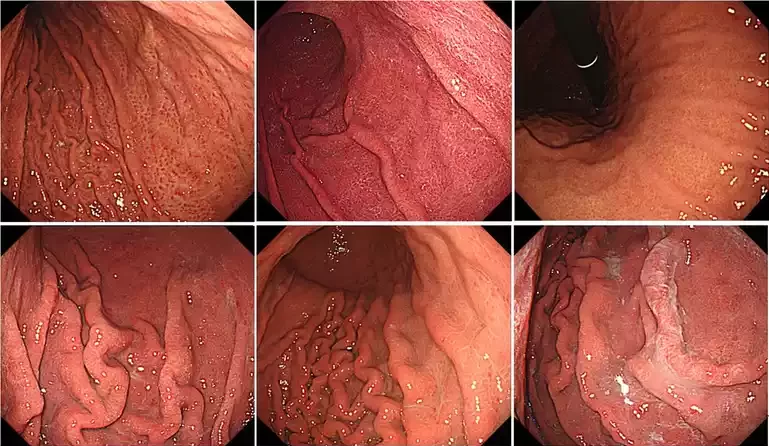
Diagnosis of Gastritis:
- Medical History and Physical Examination: The initial step often involves discussing the patient’s medical history, including symptoms, risk factors (such as medication use, alcohol consumption, and previous H. pylori infection), and family history. A physical examination may also be performed to assess abdominal tenderness or discomfort.
- Blood Tests: Blood tests can help identify signs of inflammation or infection. They may include:
- Complete Blood Count (CBC): Checking anemia and symptoms of illness.
- Serologic Tests: To detect antibodies against Helicobacter pylori.
- Stool Tests: Determine whether there is blood in stool.
- Endoscopy (Upper Gastrointestinal Endoscopy): This is a key diagnostic procedure for gastritis. A thin, flexible tube with a camera (endoscope) is inserted through the mouth and into the stomach. During the procedure, the doctor can directly visualize the stomach lining, take biopsies for further analysis, and potentially treat any bleeding or remove polyps.
- Biopsy: During the endoscopy, small tissue samples (biopsies) may be taken from the stomach lining. These samples are sent to a laboratory for examination to confirm the presence of gastritis and its underlying cause.
Diagnosis of Stomach Cancer (Gastric Cancer):
- Medical History and Physical Examination: As with gastritis, a comprehensive medical history and physical examination are conducted to assess symptoms, risk factors, and any family history of cancer.
- Endoscopy (Upper Gastrointestinal Endoscopy): Endoscopy is also a crucial diagnostic tool for stomach cancer. During this procedure, the doctor can directly visualize the stomach lining, identify suspicious areas, and take biopsies for further evaluation.
- Biopsy: Tissue samples (biopsies) obtained during endoscopy are examined under a microscope to confirm the presence of cancer cells and determine the cancer’s type and stage.
- Imaging Studies: Various imaging tests may be used to assess the extent and spread of the cancer:
- Computed Tomography (CT) Scan: Provides detailed cross-sectional images of the abdomen and surrounding structures.
- Positron Emission Tomography (PET) Scan: Helps identify areas with increased metabolic activity, which can indicate the presence of cancer.
- Endoscopic Ultrasound (EUS): Combines endoscopy with ultrasound to evaluate the depth of tumor invasion into the stomach wall and nearby lymph nodes.
- Barium Swallow or Upper GI Series: In some cases, a series of X-rays with contrast material (barium) may be used to visualize the stomach and its lining.
- Laparoscopy: This minimally invasive surgical procedure may be performed to examine the abdomen and collect additional tissue samples if there is suspicion of advanced disease.
- Staging: Staging determines the extent and severity of the cancer. It is typically based on a combination of imaging studies, endoscopy, and sometimes surgical exploration.
The diagnosis of both gastritis and stomach cancer relies on a combination of these diagnostic methods, and the choice of tests depends on the patient’s symptoms, medical history, and clinical presentation. Early diagnosis is essential for prompt treatment and better outcomes, especially in the case of stomach cancer.
Treatment options for Gastritis and Stomach Cancer
Treatment options for gastritis and stomach cancer differ significantly due to the distinct nature and severity of these conditions. Here’s an overview of the treatment options for each:
Treatment for Gastritis:
- Addressing Underlying Causes:
- H. pylori Infection: If gastritis is caused by H. pylori infection, a common treatment involves a combination of antibiotics (to eradicate the infection) and acid-reducing medications (to alleviate inflammation and symptoms).
- Medication-Induced Gastritis: For gastritis caused by medications like NSAIDs, discontinuing or reducing the use of these drugs may be necessary.
- Medications:
- Antacids: Over-the-counter antacids can provide relief by neutralizing stomach acid and reducing irritation.
- Proton Pump Inhibitors (PPIs): Prescription or over-the-counter PPIs can decrease stomach acid production, promoting healing of the stomach lining.
- H2 Blockers: These medications reduce stomach acid production and may be used in milder cases.
- Lifestyle Modifications:
- Dietary changes, such as avoiding spicy and acidic foods.
- Limiting alcohol and caffeine consumption.
- Stress management techniques.
- Smoking cessation, if applicable.
- Dietary Adjustments:
- Following a bland or easily digestible diet.
- Avoiding foods that worsen symptoms.
- Treatment of Underlying Conditions: If gastritis is associated with an underlying condition (e.g., autoimmune gastritis), addressing that condition may be necessary.
Treatment for Stomach Cancer (Gastric Cancer):
Treatment for stomach cancer depends on factors such as the cancer’s stage, type, location, and the patient’s overall health. Treatment options may include:
- Surgery: Surgical removal of the tumor is often the primary treatment for stomach cancer, especially if the cancer is localized and hasn’t spread extensively. Types of surgeries may include:
- Subtotal Gastrectomy: Removal of part of the stomach.
- Total Gastrectomy: Removal of the entire stomach.
- Lymph Node Dissection: Removal of nearby lymph nodes to check for cancer spread.
- Chemotherapy: Chemotherapy refers to the practice of administering medicines to destroy cancerous cells or slow their spread. It may be used before surgery to shrink the tumor, after surgery to eliminate any remaining cancer cells, or as palliative therapy to relieve symptoms in advanced cases.
- Radiation Therapy: Radiation therapy uses high-energy rays that target cancerous cells for destruction. It may be used in combination with surgery or chemotherapy.
- Targeted Therapy: Targeted therapies are medications designed to directly attack specific molecules associated with cancerous growth. They are used in some cases of advanced stomach cancer.
- Immunotherapy: Immunotherapy helps the immune system fight cancer. It is used in specific cases of advanced or metastatic stomach cancer.
- Palliative Care: In cases where the cancer is advanced and cannot be cured, palliative care focuses on improving the patient’s quality of life, managing symptoms, and providing emotional support.
The choice of treatment depends on the stage of the cancer and the patient’s overall health. Treatment plans are often developed by a multidisciplinary team of healthcare professionals, including oncologists, surgeons, and radiation oncologists. Early detection and intervention are crucial for improving the prognosis and chances of survival in individuals with stomach cancer.
How to Prevention of Gastritis and Stomach Cancer
Prevention strategies for gastritis and stomach cancer involve lifestyle modifications, dietary choices, and addressing risk factors. While some risk factors are beyond your control, there are steps you can take to reduce your risk. Here are some prevention strategies for both conditions:
Prevention of Gastritis:
- Address H. pylori Infection:
- If you have been diagnosed with an H. pylori infection, follow your healthcare provider’s prescribed treatment regimen, which typically includes antibiotics and acid-reducing medications.
- Practice good hygiene to reduce the risk of infection transmission to others.
- Limit NSAID Use:
- Use non-steroidal anti-inflammatory drugs (NSAIDs), such as aspirin and ibuprofen, under the guidance of a healthcare provider and only when necessary.
- Consider alternative pain relief methods when appropriate.
- Moderate Alcohol Consumption:
- If you drink alcohol, do so in moderation. Alcohol intake that exceeds recommended limits can cause damage to the stomach lining.
- Healthy Eating Habits:
- Make sure that you consume a diet rich with fruits, vegetables, whole grains and lean proteins for optimal health.
- Avoid excessive consumption of spicy, acidic, and fried foods.
- Eat smaller, more frequent meals to reduce stomach irritation.
- Stress Management:
- Practice stress-reduction techniques such as meditation, yoga, deep breathing exercises, and regular physical activity.
- Smoking Cessation:
- If you smoke, quitting smoking can reduce your risk of gastritis and other related health problems.
Prevention of Stomach Cancer:
- H. pylori Management:
- Address and treat H. pylori infections promptly, as this bacterium is a major risk factor for stomach cancer.
- Healthy Diet:
- Consume a diet rich in fruits and vegetables, which are high in antioxidants and can help reduce cancer risk.
- Limit the consumption of salted, pickled, and smoked foods, as well as processed meats.
- Include foods high in fiber and whole grains in your diet.
- Moderate Alcohol Consumption:
- If you choose to consume alcohol, be sure to do it responsibly and in moderation.
- Tobacco Avoidance:
- Avoid or quit smoking, as tobacco use is a significant risk factor for stomach cancer.
- Occupational Safety:
- If your occupation involves exposure to chemicals or substances associated with an increased risk of stomach cancer, take necessary precautions and follow safety guidelines.
- Maintain a Healthy Weight:
- Obesity has been linked to an increased risk of stomach cancer, so aim to achieve and maintain a healthy weight through diet and regular exercise.
- Regular Check-ups:
- If you have a family history of stomach cancer or other risk factors, discuss your risk with a healthcare provider. They may recommend surveillance or screening tests.
- Screening (in High-Risk Populations):
- In some regions with a high incidence of stomach cancer, screening programs may be available for individuals at increased risk.
Prevention strategies can vary depending on individual circumstances and risk factors. It’s essential to consult with a healthcare provider for personalized guidance and to discuss any concerns about your risk of gastritis and stomach cancer. Regular medical check-ups and screenings can also help detect any potential issues early, improving the chances of successful prevention or early intervention.
Conclusion
While Gastritis and Stomach cancer both affect the stomach, they are distinct conditions with different causes, symptoms, and treatments. Gastritis, often related to factors like H. pylori infection or medication use, is generally manageable through lifestyle changes and medications. Stomach cancer, on the other hand, is a more severe malignancy that demands early detection and aggressive interventions like surgery, chemotherapy, and radiation therapy for better outcomes.
By understanding the differences between these conditions and adopting preventive measures, individuals can take proactive steps to protect their stomach health and reduce the risks associated with gastritis and stomach cancer. Regular medical check-ups, a healthy lifestyle, and awareness of potential risk factors are essential for maintaining digestive health.

